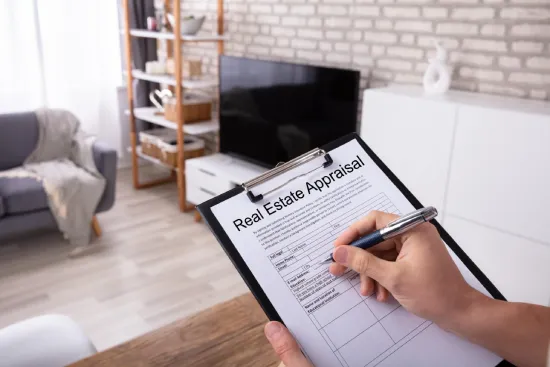Home Valuation
A home valuation or appraisal is an important step in successfully completing a real estate sale. If the buyer is taking out a mortgage to buy the property, they will pay for the home appraisal since it’s required by the lender. However, it’s in your interest as a homeowner that the home valuation goes as smoothly as possible because if the appraised value of the home is significantly lower than the price you are asking for, the buyer may back out with their deposit thanks to the appraisal contingency.
You will also need to prepare for a home valuation when getting your property refinanced, getting a home equity loan, or a different loan where you offer your home as collateral. There are six steps you can take when preparing for a home valuation.
- STEP 1
- STEP 2
- STEP 3
- STEP 4
- STEP 5
- STEP 6
Understand The Home Valuation Process
Understanding what an appraiser looks for when evaluating a property’s value can help you with your own research and determine whether the appraised value is accurate or not. These include the location of the property, comparable properties, size of the apartment, number of bathrooms and bedrooms, construction materials, and – if you are in a co-op – the financials of the co-op (including its reserve funds). These are factors you can’t influence and are not prepared for. However, appraisers also take into account the apartment’s condition, remodels/renovations, the kitchen, etc., when coming up with a home’s value.
Conduct Your Own Research
Doing your own research to come up with an accurate value of your property has two benefits. The actual appraised value will be closer to what you are asking for, and if it isn’t, you could potentially have enough data to challenge the appraisal. But keep in mind, the reason why it’s so important to be prepared in advance is because it can be extremely difficult to win a challenge on an appraisal. You might also collect more data than an appraiser would, like if a comparable property sold for less because of a poor view or because it needed a gut renovation. The same goes for neighborhood specifics. If there are overlapping boundaries, you can let the appraiser know which neighborhood your apartment building is situated in.
Complete All The Basic Repairs You Can
In most cases, a property’s condition is not as big a factor in determining the value as comparable property values and locations are, but it’s still a factor. Small repairs in the bathroom and kitchen and some low-cost replacements can make a significant impression. The idea is to show your property in the best possible light. And such repairs convey the feeling that the property is well-kept, which may move the appraiser to mark your property’s value closer to newly renovated comparable properties instead of older ones.
Clean And Stage Your Property
You don’t clean and stage your home for an appraisal the same way as you do for your potential buyers visiting your property. Cleaning itself doesn’t carry any valuation points, but it presents your property in a good light. Similarly, staging the property, which should include decluttering- removing/rearranging the bulky items, can help your home look more spacious to the appraiser. A fresh coat of paint is also a good idea.
Convey The Relevant Information To The Appraiser
The only time you will get to converse with the appraiser is during the appraisal, so make sure you convey the right information. Provide any major repairs and renovations you’ve made to the property since you bought it (even if it was years ago). Any differentiating factors from other comparable properties, like a preserved wooden floor or a classic fireplace, should also be highlighted. You can also compile all the information you gathered in a package and hand it over to the appraiser. However, make sure you give the appraiser their space.
Challenge The Appraisal (If Needed)
If your property is appraised for less than the asking price, the buyer can challenge the appraisal, not you. If the buyer wants to negotiate a lower price, you will need ample data to convince them that your property is worth more than the appraised value, or they might back out of the deal. You may, however, challenge an appraisal when applying for a home equity loan. To challenge, acquire the hard copy assessment report and compare it with your own research (especially comparable properties, location, and renovation/upgrade factors) and present your findings to the bank you went to the loan for.
ARTICLES FOR BUYERS

Financing Your NYC Real Estate Investment Through Mortgage
It’s possible to get a bank/financial institution to finance (part of) your real estate investment, but the process is different

What NYC Property Sellers Need To Know About Virtual Tours
Virtual tours are a great way to create a reusable digital tour of your property that potential buyers can take advantage of from the comfort of their homes.

What Is ACRIS?
ACRIS allows buyers, property owners, brokers, and attorneys to look at and gain insights from property documents like deeds and mortgage records.
ARTICLES FOR SELLERS

What Is An Appraisal?
Property appraisal is the process of evaluating a property to determine its fair price in the current market. It’s performed by third-party professionals called appraisers.

How Much Are Closing Costs?
Closing costs can range between 2-4% of the property price for buyers and 8-10% for sellers because they have to pay the brokers’ commission.

What Is An HVAC?
An HVAC system is responsible for circulating hot and cold air inside a building and maintaining the indoor temperature at comfortable levels.








